Connecting Rod Measurement
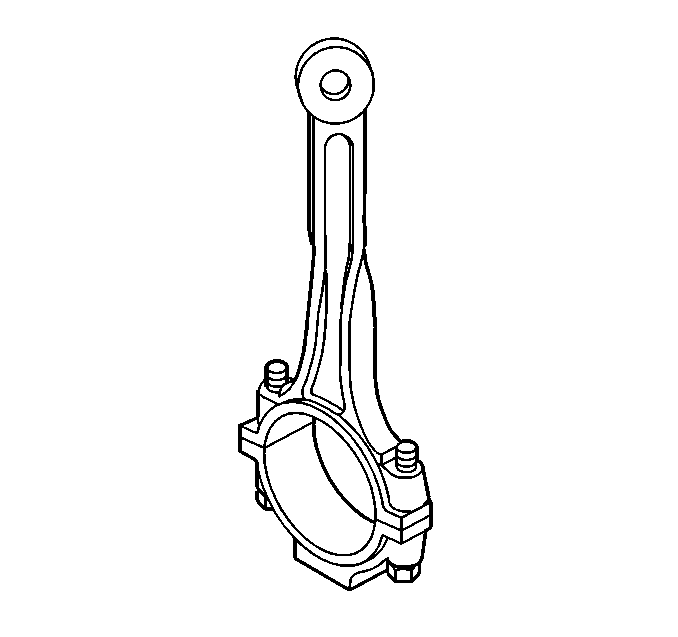
- Clean the connecting rods
in solvent and dry with compressed air.
- Inspect the connecting rods for the following conditions:
| • | Signs of being twisted, bent, nicked, or cracked |
| • | Scratches or abrasion on the rod bearing seating surface |
- If the connecting rod bores contain minor scratches or abrasions,
clean the bores in a circular direction with a light emery paper. DO NOT scrape
the rod or rod cap.
- Measure the piston pin to connecting rod bore using the following
procedure:
| 4.1. | Using an outside micrometer, take two measurements of the piston
pin in the area of the connecting rod contact. |
| 4.2. | Using an inside micrometer, measure the connecting rod piston
pin bore. |
| 4.3. | Subtract the piston pin diameter from the piston pin bore diameter. |
| 4.4. | The clearance should not be more than 0.032 mm (0.0013 in). |
- If there is excessive clearance, replace the piston pin.
- If there is still excessive clearance, replace the connecting
rod.
- If there is evidence of pin bore or pin scoring, replace the rod
and pin assembly.
Piston Measurement
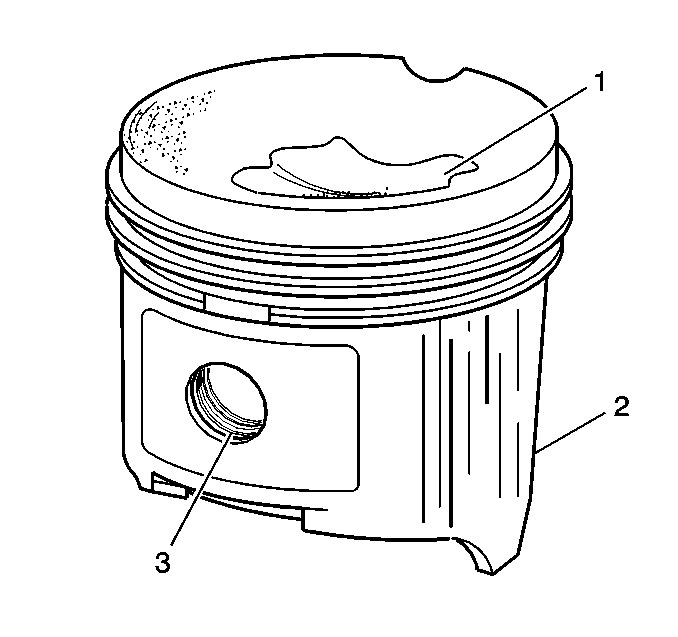
- Clean the piston skirts
and the pins with a cleaning solvent. DO NOT wire brush any part of the piston.
- Clean the piston ring grooves. Ensure that the oil ring holes
and slots are clean.
- Inspect the pistons for the following conditions:
| • | Cracked ring lands, skirts, or pin bosses |
| • | Ring grooves for nicks, burrs that may cause binding |
| • | Warped or worn ring lands |
| • | Eroded areas at the top of the piston (1) |
| • | Scuffed or damaged skirts (2) |
| • | Worn piston pin bores (3) |
- Replace pistons that show any signs or damage or excessive wear.
- Measure the piston pin bore to piston pin clearances using the
following procedure:
| 5.1. | Piston pin bores and pins must be free of varnish or scuffing. |
| 5.2. | Use an outside micrometer to measure the piston pin in the piston
contact areas. |
| 5.3. | Using an inside micrometer, measure the piston pin bore. |
| 5.4. | Subtract the measurement of the piston pin bore from the piston
pin. The clearance should be within 0.002-0.011 mm (0.00008-0.00043 in). |
| 5.5. | If the clearance is excessive, determine which component is out
of specification. |
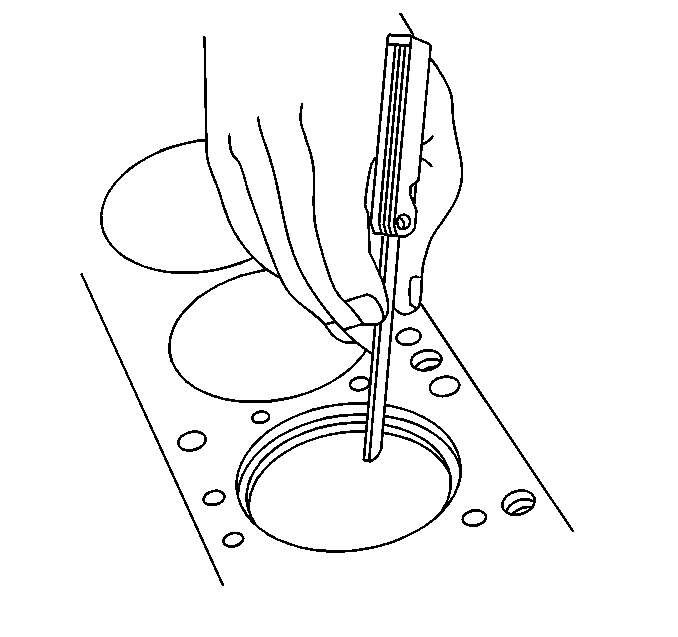
- Measure the piston ring
end gap using the following procedure:
| 6.1. | Place the piston ring in the area of the bore where the piston
ring will travel (approximately 25 mm or 1 inch down from the
deck surface). Ensure that the ring is square with the cylinder bore by
positioning the ring with the piston head. |
| 6.2. | Measure the end gap of the piston ring with feeler gages. Compare
the measurements with those provided below: |
| • | The top compression ring end gap should be 0.15-0.30 mm
(0.006-0.012 in). |
| • | The second compression ring end gap should be 0.25-0.40 mm
(0.0098-0.0157 in). |
| • | The oil ring end gap should be 0.25-0.76 mm (0.0098-0.0299 in). |
| 6.3. | If the clearance exceeds the provided specifications, the piston
rings must be replaced. |
| 6.4. | Repeat the procedure for all the piston rings. |
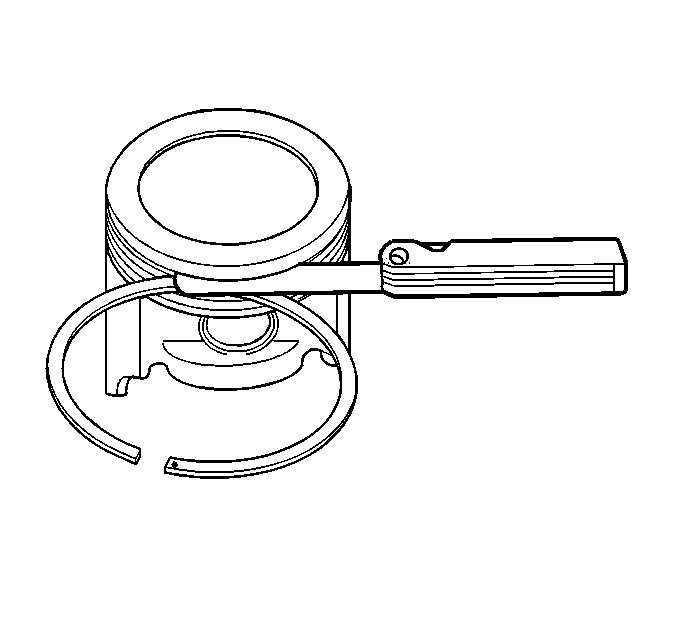
- Measure the piston ring
side clearance using the following procedure:
| 7.1. | Roll the piston ring entirely around the piston ring groove. If
any binding is caused by a burr on the corner of the ring groove, carefully
dress the groove corner with a fine file. If any binding is caused by
a distorted piston ring, replace the ring. |
| 7.2. | With the piston ring on the piston, use feeler gages to check
clearance at multiple locations. |
| 7.3. | The clearance between the surface of the top piston ring and the
ring land should be no greater than 0.080 mm (0.0031 in). |
| 7.4. | If the clearance is greater than specifications, replace the piston
ring. |
| 7.5. | If the new ring does not reduce the top ring side clearance to
0.080 mm (0.0031 in) or less, install a new piston. |
- The top compression ring may be installed with either side up.
There is a locating dimple on the 2nd compression ring near the end for identification
of the top side. Install the 2nd compression ring with the dimple facing
up.
- The clearance between the surface of the second piston ring and
the ring land should be no greater than 0.070 mm (0.0028 in).
- If the new ring does not reduce the clearance to 0.070 mm
(0.0028 in) or less, install a new piston.
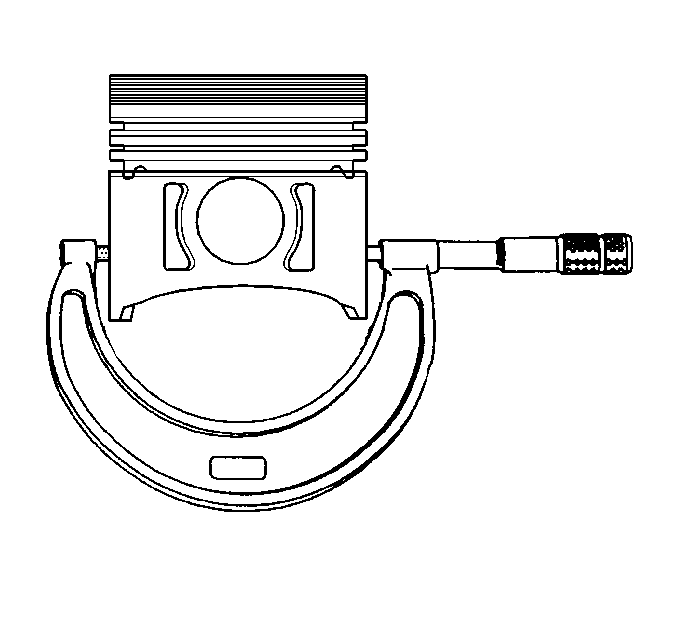
- Measure piston width using
the following procedure:
| 11.1. | Using an outside micrometer, measure the width of the piston 48 mm
(1.8897 in) above the bottom of the piston skirt at the thrust surface
perpendicular to the centerline of the piston pin. |
| 11.2. | Compare the measurement of the piston to its original cylinder
by subtracting the piston width from the cylinder diameter. |
| 11.3. | The proper clearance specification for the piston is 0.010-0.038 mm
(0.0006-0.0015 in). |
- If the clearance obtained through measurement is greater than
these specifications and the cylinder bores are within specification, replace
the piston.





